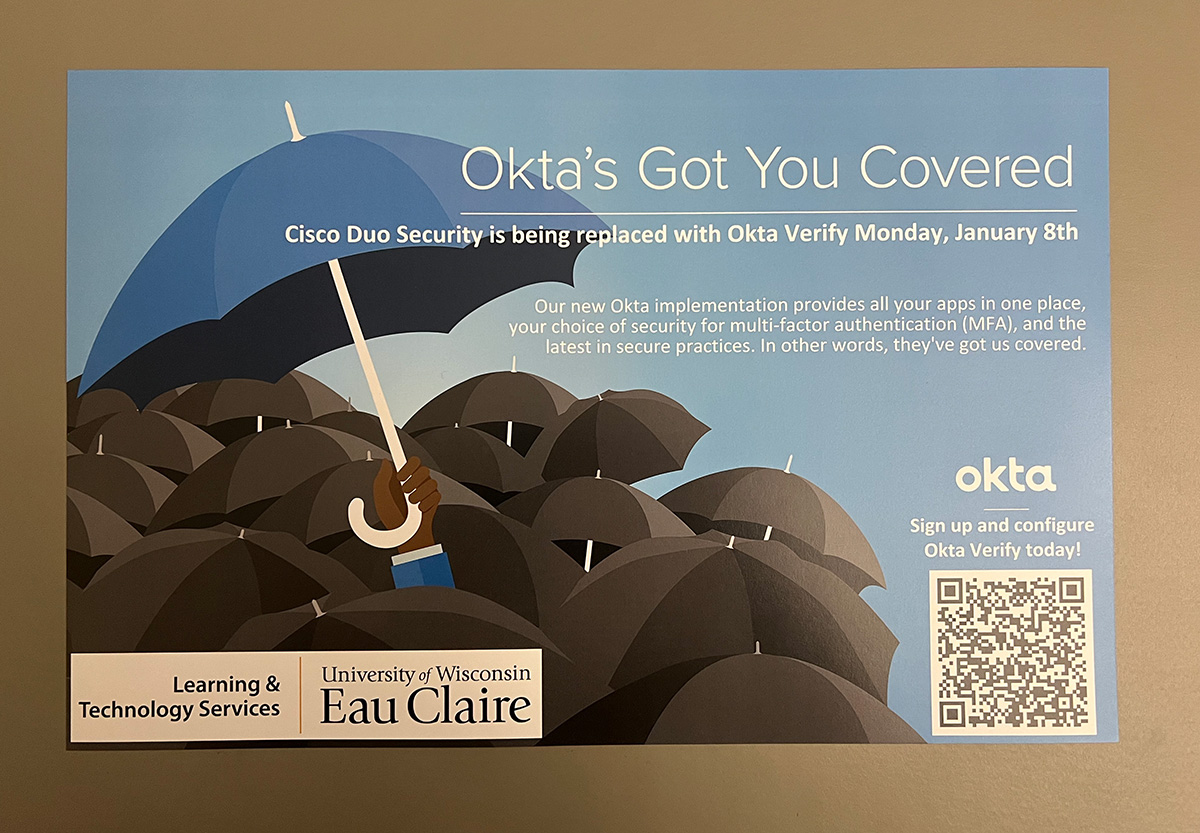On Monday, Jan. 8, UW-Eau Claire will switch from using Duo Security as its multifactor authentication system to Okta Verify as part of a system-wide switch.
According to the information security authentication procedure set by the UW System, students and employees accessing university applications and websites with high-risk data, such as CampS and Canvas, must use multifactor authentication.
Duo Security is a two-factor authentication system that verifies user account sign-ins through mechanisms such as receiving a push notification from the Duo Mobile app, receiving a text message or phone call or using a physical Duo token.
UW-Eau Claire tested Duo Security with volunteers in December 2017 and January 2018, before being rolled out to administrative staff and student employees in February and March 2018, faculty in March and April 2018 and finally all students during the 2018 fall semester.
Kent Gerberich, the chief information officer and director of Learning and Technology Services (LTS), said the switch to Okta Verify will save UW-Eau Claire around $60,000 annually, which he hopes to invest back into learning spaces that need updated technology.
“(Okta) is a good product that’s used by a number of companies and organizations that hire out across the world and it’s very strong in my opinion,” Gerberich said.
Okta Verify allows users to authenticate their sign-ins by the same mechanisms of Duo Security with the addition of using biometric authentication, such as fingerprint or facial recognition.
“(Okta Verify has the) same kind of philosophy, same approach. Download the app, configure it and then use it when it prompts you,” Gerberich said.
The current physical Duo tokens will not work with Okta Verify. Students and employees can request an Okta token purchased by the university through an eForm, although Gerberich said they are trying to reserve Okta tokens for users who need them, as they cost around $30 apiece.
“We’re trying to minimize usage to individuals that have that accessibility need or that have a strong case like that they don’t have a smartphone or there are personal reasons,” Gerberich said. “We can’t force employees to use their personal device for work, so if they don’t want to use that, then we have other options that make sense.”
Other known technical limitations include the iOS native email app not working after the Okta Verify App is downloaded on iPhones and the default Gmail mobile app not working on Android phones.
Users can delete and re-add their email accounts in the iOS native email app to work around this issue, but LTS recommends using the Outlook mobile app instead of the default Gmail mobile app on Android phones.
According to Gerberich, LTS is currently working with the support team at Okta Verify to address the known technical limitations.
Gerberich said the step-by-step process of setting up Okta Verify is outlined on the UW-Eau Claire website, and that students and employees should continue using Duo Security until Monday, Jan. 8, but it is crucial to set up the new multifactor authentication before the switch.
“It’s very important to proactively set Okta up and configure it,” Gerberich said. “So when Monday, Jan. 8 does come you’re all ready to go, otherwise you will not be able to log into those systems that currently require Duo.”
Gerberich said the process is straightforward and that members of the Student Senate and Information Technology Commission set up their Okta Verify accounts without any issues.
During the Student Senate meeting on Monday, Nov. 6, President Brett Farmer demonstrated the process of setting up Okta Verify to the general assembly body.
Drew Morehouse, a fourth-year computer science and actuarial science student, is the director of the Information Technology Commission.
Morehouse said the IT Commission’s role in this switch has primarily been through giving feedback. In a recent commission meeting, members went through setting up Okta Verify and then gave LTS feedback on the enrollment process.
“The commission’s feedback so far is that it’s a pretty easy switch and we’re looking forward to the Jan. 8 date when we finally get to all use Okta on campus,” Morehouse said.
Morehouse worked at a company during the summer that uses Okta Verify and said he found the system to be more modern. Morehouse said some users had issues with the Duo Mobile app and he is hopeful that the Okta Verify app will work better when sending push notifications.
“From a student perspective, all I would say is that I’m really optimistic about Okta,” Morehouse said. “I’m a senior here and I’ve been forced to use Duo this whole time and I’m really looking forward to having a better system for dual authentication that the university requires.”
Kasper can be reached at kasperml9306@uwec.edu.















